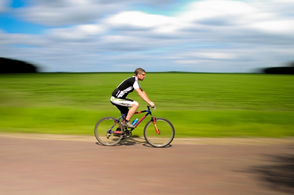
Everyone knows that if you have consumed enough alcohol to be in excess of the legal limit and drive an automobile, motorcycle or truck on the open road, you can be charged and perhaps convicted with operating while intoxicated. But what about other means of transportation on a public road? Can you be convicted of operating a bicycle while intoxicated? A riding lawnmower? A horse?
The drunk-driving statute, MCL 257.625(1), states “[a] person, whether licensed or not, shall not operate a vehicle upon a highway or other place open to the general public or generally accessible to motor vehicles, including an area designated for the parking of vehicles, within this state if the person is operating while intoxicated.” Note that the statute uses the word “vehicle” and not “motor vehicle”. In fact, both the words “vehicle” and “motor vehicle” have distinct definitions in the Michigan Vehicle Code:
- MCL 257.33 – “‘Motor vehicle’ means every vehicle that is self-propelled, but for purposes of chapter 4, motor vehicle does not include industrial equipment such as a forklift, a front-end loader, or other construction equipment that is not subject to registration under this act. Motor vehicle does not include a power-driven mobility device when that power-driven mobility device is being used by an individual with a mobility disability. Motor vehicle does not include an electric patrol vehicle being operated in compliance with the electric patrol vehicle act, 1997 PA 55, MCL 257.1571 to 257.1577. Motor vehicle does not include an electric personal assistive mobility device. Motor vehicle does not include an electric carriage. Motor vehicle does not include a commercial quadricycle. Motor vehicle does not include an electric bicycle. Motor vehicle does not include an electric skateboard.”
- MCL 257.79 – “‘Vehicle’ means every device in, upon, or by which any person or property is or may be transported or drawn upon a highway, except devices exclusively moved by human power or used exclusively upon stationary rails or tracks and except, only for the purpose of titling and registration under this act, a mobile home as defined in section 2 of the mobile home commission act, Act No. 96 of the Public Acts of 1987, being section 125.2302 of the Michigan Compiled Laws.”
The definition of “motor vehicle” explicitly excludes electric patrol vehicles, electric personal assistive mobility devices, electric carriages, commercial quadricycles, electric bicycles and electric skateboards. However, these items are NOT excluded in the definition of “vehicle” which is used in the operating while intoxicated statute. In People v Lyon, unpublished per curiam opinion of the Court of Appeals issued May 19, 2015 (Docket No. 319242), the Michigan Court of Appeals reversed the dismissal of an OWI-3rd offense charge where the defendant was driving his personal, slow-moving electric 4-wheeled scooter while under the influence of alcohol. Even though it may have been a substitute for his wheelchair, the defendant’s use of the electric scooter on a public highway classified its use as a “vehicle” and subject to all the same rules of the road as an automobile.
It doesn’t even matter if it was illegal to operate that vehicle on the road in the first place. In People v. Rogers, 438 Mich 602; 475 NW2d 717 (1991), the Michigan Supreme Court determined that defendant’s use of a snowmobile on the shoulder of a road while under the influence of alcohol makes him eligible to be charged with operating while intoxicated. Although state law prevents the operation of a snowmobile on a highway, it is nevertheless a motorized device fitting the definition of “vehicle” in Michigan’s traffic code when it is used as such.
The broad definition of vehicle encompasses every “device” on the road that is not exclusively propelled by human power, or operates on a stationary track or is an affixed mobile home. This includes riding lawnmowers, Segway personal transport vehicles, off-road three wheelers and go-karts. However, “vehicle” would NOT include the following:
- Bicycles, since they are operated solely by human power.
- Trains, provided they operate on a stationary rail (Note: there are separate statutes for operating a locomotive while under the influence).
Interestingly, horseback riders and horse-drawn buggies are considered “vehicles” when used as such. “A person riding an animal or driving an animal-drawn vehicle upon a roadway shall be granted all of the rights and shall be subject to all the duties, criminal penalties, and civil sanctions applicable to the driver of a vehicle by [the Michigan Vehicle Code].” MCL 257.604. While treated as a “vehicle”, a horseback rider and horse-drawn buggy driver could be subject to prosecution while operating under the influence.
Being charged with operating while intoxicated is no laughing matter. When facing such accusations, you need a criminal defense lawyer that is willing to fight every single aspect of the case, including whether or not you were even operating a “vehicle” as defined in the Michigan Vehicle Code. If you or a loved one is in need of legal representation, do not hesitate to contact the experienced attorneys at Kershaw, Vititoe & Jedinak PLC today.





